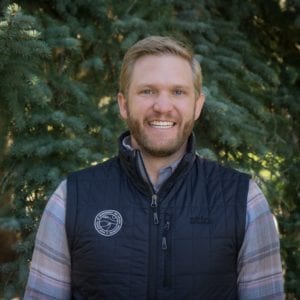 ASLE’s Scholar of the Month for May 2020 is Matt Henry.
ASLE’s Scholar of the Month for May 2020 is Matt Henry.
Matt Henry is a Scholar in Residence at the University of Wyoming, where he holds a joint appointment with the Haub School of Environment and Natural Resources, the School of Energy Resources, and the Department of English. His research focuses on environmental justice, the energy humanities, and just transitions.
How did you become interested in studying ecocriticism and/or the environmental humanities?
I grew up fly-fishing, floating rivers, hiking, and backpacking in western Montana, so I’ve always cared about environmental issues. Outdoor recreation was my gateway. After a bit of a meandering route in my M.A. program and the first year of my PhD program, I began working with Joni Adamson and Claudia Sadowski-Smith at Arizona State University, and the prospect of studying ecocriticism and environmental humanities through a social justice lens just made sense to me. I viewed it as a way to connect my scholarly interests with activism and advocacy for issues I deeply care about, and I’ve come to believe that the humanities are utterly critical to getting us through coming decades of rapid environmental and social change. I’ve never looked back.
Who is your favorite environmental artist, writer, or filmmaker? Or what is your favorite environmental text? Why?
It’s always hard to choose. Some of my favorite writers are Karen Tei Yamashita, Leslie Marmon Silko, Linda Hogan, Helena María Viramontes – all formative influences on my journey, during graduate school, to reconsider my prior affinities for canonical (white male) environmental writers with problematic views on race and indigeneity. All terrific writers, they were my gateway for becoming invested in environmental justice research. But my list of favorite individual texts is always changing. I thought Kim Stanley Robinson’s New York 2140 was a fantastic and much-needed addition to the climate canon and I loved Ad Astra Comix’s graphic novel The Beast: Making a Living on a Dying Planet and its commentary on oil and advertising. I could go on and on.
What are you currently working on?
Right now, I’m really invested in energy humanities research and the concept of a just transition, which really seem to resonate in Wyoming. I’m working on a monograph that explores the critical role of the arts – literature, visual media, performance, public art – in imagining a just transition, but I’m also doing some public humanities and policy work. I recently started collaborating with a human ecologist to hold scenario-planning workshops and engage in narrative research with high school students in Wyoming towns most impacted by declining coal markets. We’re facilitating a statewide writing contest to amplify youth visions for the future of Wyoming. I also just co-authored an article covering the genealogy of the just transition concept and existing policies that support a just transition with policy experts at the Payne Institute for Public Policy at the Colorado School of Mines and the Blue Green Alliance. We’re hopeful it’ll publish soon. So I’ve been pretty focused on applying environmental humanities insights in community-engaged research and policy arenas.
What is something you are reading right now (environmental humanities-related or otherwise) that inspires you, either personally or professionally?
Right now I’m reading Shale Play, a book of poetry and photographs by Julia Kasdorf and Jeff Rubin that documents the socio-ecological dimensions of hydraulic fracturing in western Pennsylvania. It inspires me because it so richly stories the experiences of energy-dependent communities in the rural U.S. and also because much of my family lives there. I’m also reading Jedediah Purdy’s This Land is Our Land, which so far has moved me as a poetic rumination on how rethinking land ownership in the United States can serve as a path to a more equitable, sustainable future. It seems to me another angle to think about a what a just transition might look like.
Oh, and Ross Gay’s poetry collection Catalog of Unabashed Gratitude is bedtime reading right now and a great balm for pandemic-induced anxiety.
Is there a scholar in the field who inspires you? Why?
Joni Adamson has always inspired me for her work at the intersections of environmental justice and ecocriticism and argument that transformative knowledge work takes place not just in the academy, but in the community. She was also a terrific co-advisor when I was in graduate school. Another scholar who really inspires me is Kyle Whyte. The ways he connects his research on Indigenous climate justice and environmental ethics to think through alternative ways of understanding environmental and social resilience is so vital, and an example of what environmental humanities research can do in communities.
